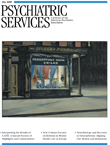Smoking Bans in State Hospitals: Patients' Rights and Patients' Health: Reply
In Reply: I appreciate Dr. Chisholm's response, but the dilemma remains, notwithstanding. The question before us is: If promoting patients' health is a core professional goal of psychiatrists, if an improved sense of well-being would come from patients' feeling physically healthy and learning that they can function "without being enslaved to an addiction," what justifies our confining this beneficence to a small, largely disadvantaged, largely disempowered group of individuals who constitute what we might call a "captive audience"? Why do we not bestow this beneficence on all psychiatric patients? All staff? All citizens? Is it morally acceptable to single out long-term psychiatric inpatients (as distinct from everyone else) for a coercive intervention just because we can?
My understanding of my professional role as a psychiatrist is as follows: if I agree to treat someone for, say, an anxiety disorder, and if this person also has a family history of cancer of the colon, I cannot then decide, willy-nilly, to order a colonoscopy to be performed involuntarily simply because I believe it to be indicated. I would have to engage my patient in a conversation aimed at obtaining his or her informed consent. Alternatively, if I thought the patient lacked the decisional capacity to think with me about this issue, I would consider petitioning the court of probate (as per statute), and a formal hearing would ensue. At no point would I be entitled to say, "Since my patient is a member of the class of, say, male psychiatrists in private practice in Atascadero, California, due process is suspended."
Dr. Chisholm's point concerning alcohol is an interesting one. I would want to give it more thought, but preliminarily I would say that banning alcohol on inpatient units is justified because of its acute intoxicating effects and therefore its potential for disruption of the therapeutic milieu (not because of its addictive nature).
I do agree (as I said before) that the effects of second-hand smoke should be minimized for everyone (not just employees). But I would agree even more heartily if those employees were similarly enjoined from smoking in their homes so that visitors, passers-by, other residents, housing employees, and the like were similarly protected from "unnecessary harm."
The essential point is that psychiatric patients have long been considered to be what might be called, in the current lexicon, "decisionally challenged." The recovery movement has been laboring to dispel that stigmatized image.Smoking as a public health matter is a political issue as well as a wellness issue. The fate of Prohibition is a cautionary tale illustrating what can happen when "health values" are unilaterally imposed upon a diverse population where the power gradient is more level. (We owe, by the way, the fact that we can legally consume alcohol in our homes to the repeal of Prohibition.) But by singling out institutionalized psychiatric patients for "special treatment," we are in danger of living up to John Kenneth Galbraith's description of this country as a "democracy of the fortunate." Before we ask a stigmatized and historically disempowered group to have the courage of our convictions, perhaps we should demonstrate that courage, on the larger political scene, ourselves.

